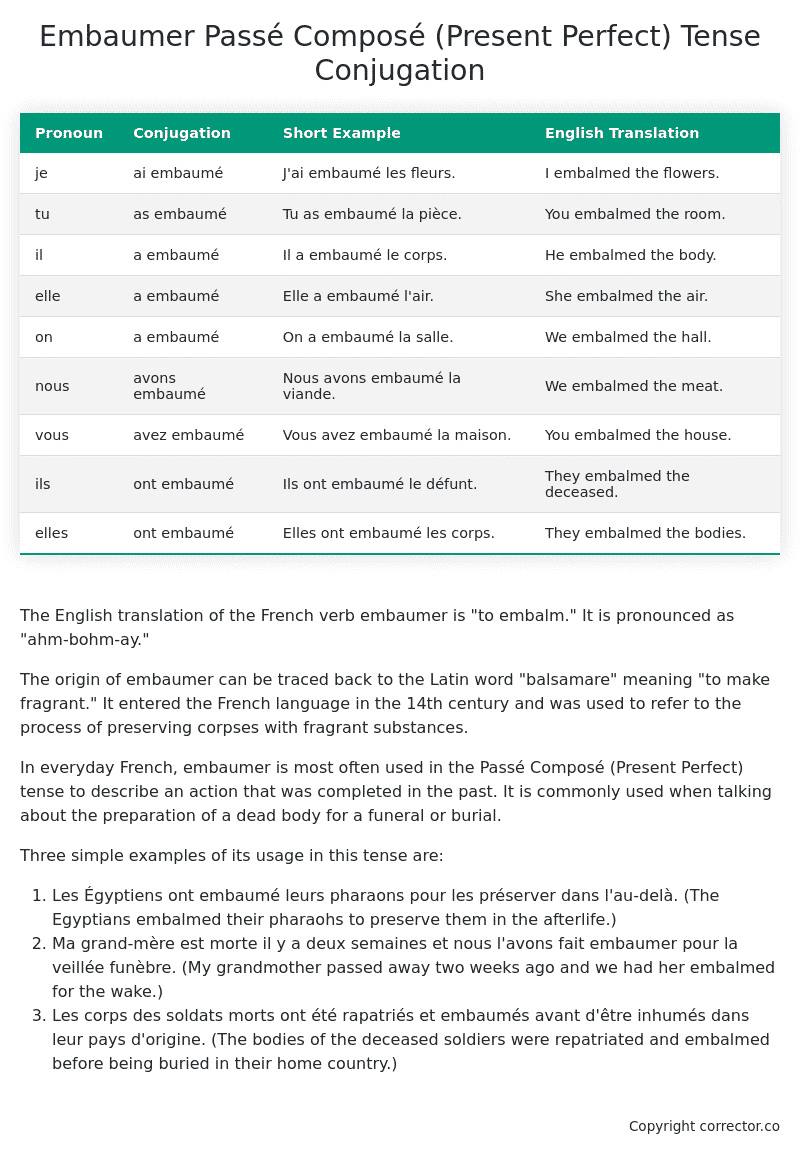Passé Composé (Present Perfect) Tense Conjugation of the French Verb embaumer
Introduction to the verb embaumer
The English translation of the French verb embaumer is “to embalm.” It is pronounced as “ahm-bohm-ay.”
The origin of embaumer can be traced back to the Latin word “balsamare” meaning “to make fragrant.” It entered the French language in the 14th century and was used to refer to the process of preserving corpses with fragrant substances.
In everyday French, embaumer is most often used in the Passé Composé (Present Perfect) tense to describe an action that was completed in the past. It is commonly used when talking about the preparation of a dead body for a funeral or burial.
Three simple examples of its usage in this tense are:
- Les Égyptiens ont embaumé leurs pharaons pour les préserver dans l’au-delà. (The Egyptians embalmed their pharaohs to preserve them in the afterlife.)
- Ma grand-mère est morte il y a deux semaines et nous l’avons fait embaumer pour la veillée funèbre. (My grandmother passed away two weeks ago and we had her embalmed for the wake.)
- Les corps des soldats morts ont été rapatriés et embaumés avant d’être inhumés dans leur pays d’origine. (The bodies of the deceased soldiers were repatriated and embalmed before being buried in their home country.)
Table of the Passé Composé (Present Perfect) Tense Conjugation of embaumer
| Pronoun | Conjugation | Short Example | English Translation |
|---|---|---|---|
| je | ai embaumé | J’ai embaumé les fleurs. | I embalmed the flowers. |
| tu | as embaumé | Tu as embaumé la pièce. | You embalmed the room. |
| il | a embaumé | Il a embaumé le corps. | He embalmed the body. |
| elle | a embaumé | Elle a embaumé l’air. | She embalmed the air. |
| on | a embaumé | On a embaumé la salle. | We embalmed the hall. |
| nous | avons embaumé | Nous avons embaumé la viande. | We embalmed the meat. |
| vous | avez embaumé | Vous avez embaumé la maison. | You embalmed the house. |
| ils | ont embaumé | Ils ont embaumé le défunt. | They embalmed the deceased. |
| elles | ont embaumé | Elles ont embaumé les corps. | They embalmed the bodies. |
Other Conjugations for Embaumer.
Le Present (Present Tense) Conjugation of the French Verb embaumer
Imparfait (Imperfect) Tense Conjugation of the French Verb embaumer
Passé Simple (Simple Past) Tense Conjugation of the French Verb embaumer
Passé Composé (Present Perfect) Tense Conjugation of the French Verb embaumer (this article)
Futur Simple (Simple Future) Tense Conjugation of the French Verb embaumer
Futur Proche (Near Future) Tense Conjugation of the French Verb embaumer
Plus-que-parfait (Pluperfect) Tense Conjugation of the French Verb embaumer
Passé Antérieur (Past Anterior) Tense Conjugation of the French Verb embaumer
Futur Antérieur (Future Anterior) Tense Conjugation of the French Verb embaumer
Subjonctif Présent (Subjunctive Present) Tense Conjugation of the French Verb embaumer
Subjonctif Passé (Subjunctive Past) Tense Conjugation of the French Verb embaumer
Subjonctif Imparfait (Subjunctive Imperfect) Tense Conjugation of the French Verb embaumer
Subjonctif Plus-que-parfait (Subjunctive Pluperfect) Tense Conjugation of the French Verb embaumer
Conditionnel Présent (Conditional Present) Tense Conjugation of the French Verb embaumer
Conditionnel Passé (Conditional Past) Tense Conjugation of the French Verb embaumer
L’impératif Présent (Imperative Present) Tense Conjugation of the French Verb embaumer
L’infinitif Présent (Infinitive Present) Tense Conjugation of the French Verb embaumer
Struggling with French verbs or the language in general? Why not use our free French Grammar Checker – no registration required!
Get a FREE Download Study Sheet of this Conjugation 🔥
Simply right click the image below, click “save image” and get your free reference for the embaumer present perfect tense conjugation!

Embaumer – About the French Passé Composé (Present Perfect) Tense
Formation of the Passé Composé
Set the auxiliary verb with either
Conjugate the auxiliary verb
Add the past participle
Common everyday usage patterns
Narrating Past Events
Sequential Actions
Describing Completed Actions
Interactions with other tenses
Imperfect Tense
Conditional and Future Tenses
Summary
I hope you enjoyed this article on the verb embaumer. Still in a learning mood? Check out another TOTALLY random French verb conjugation!


